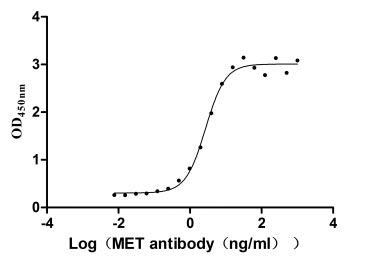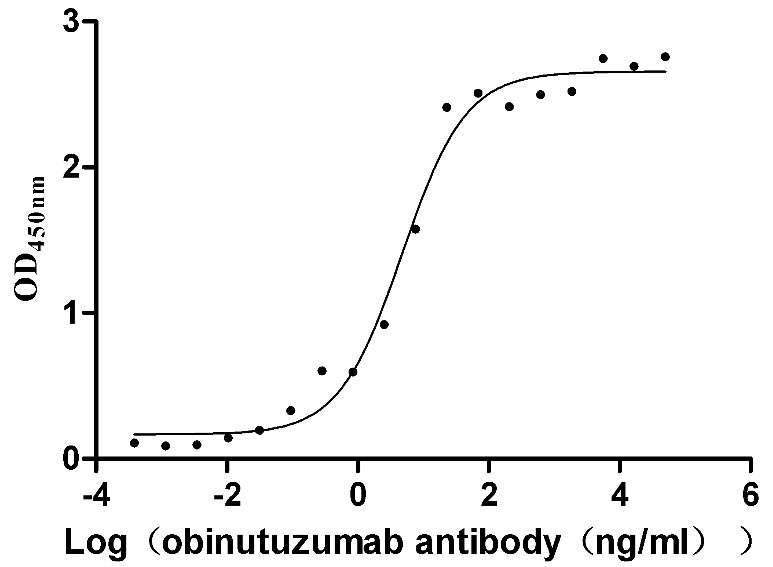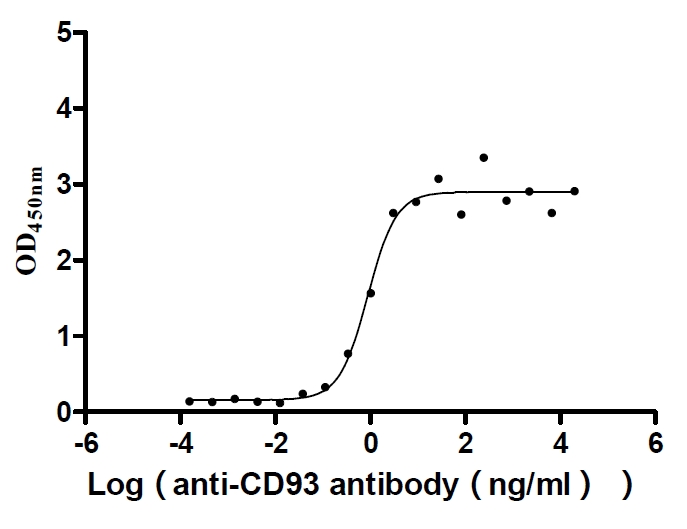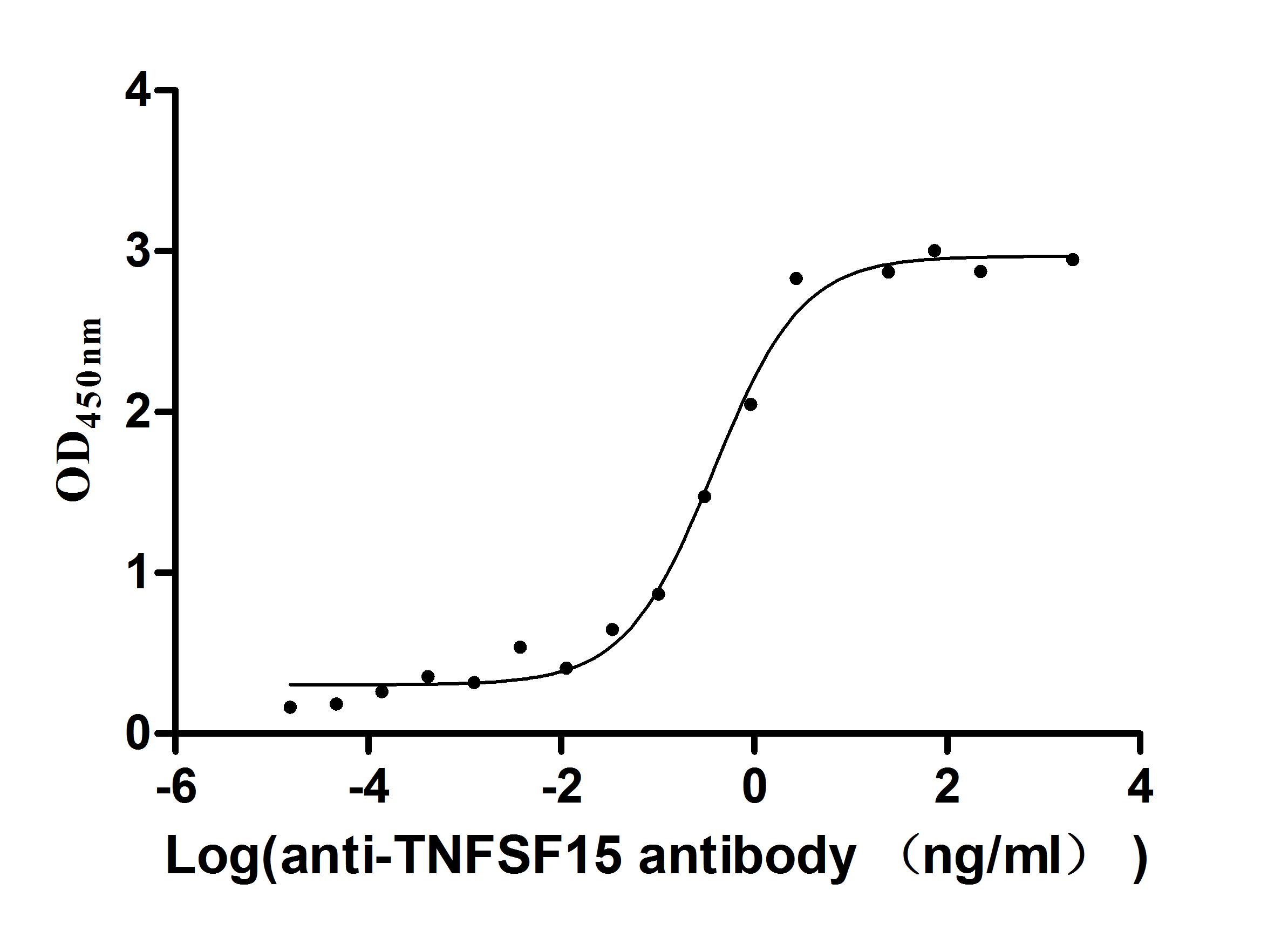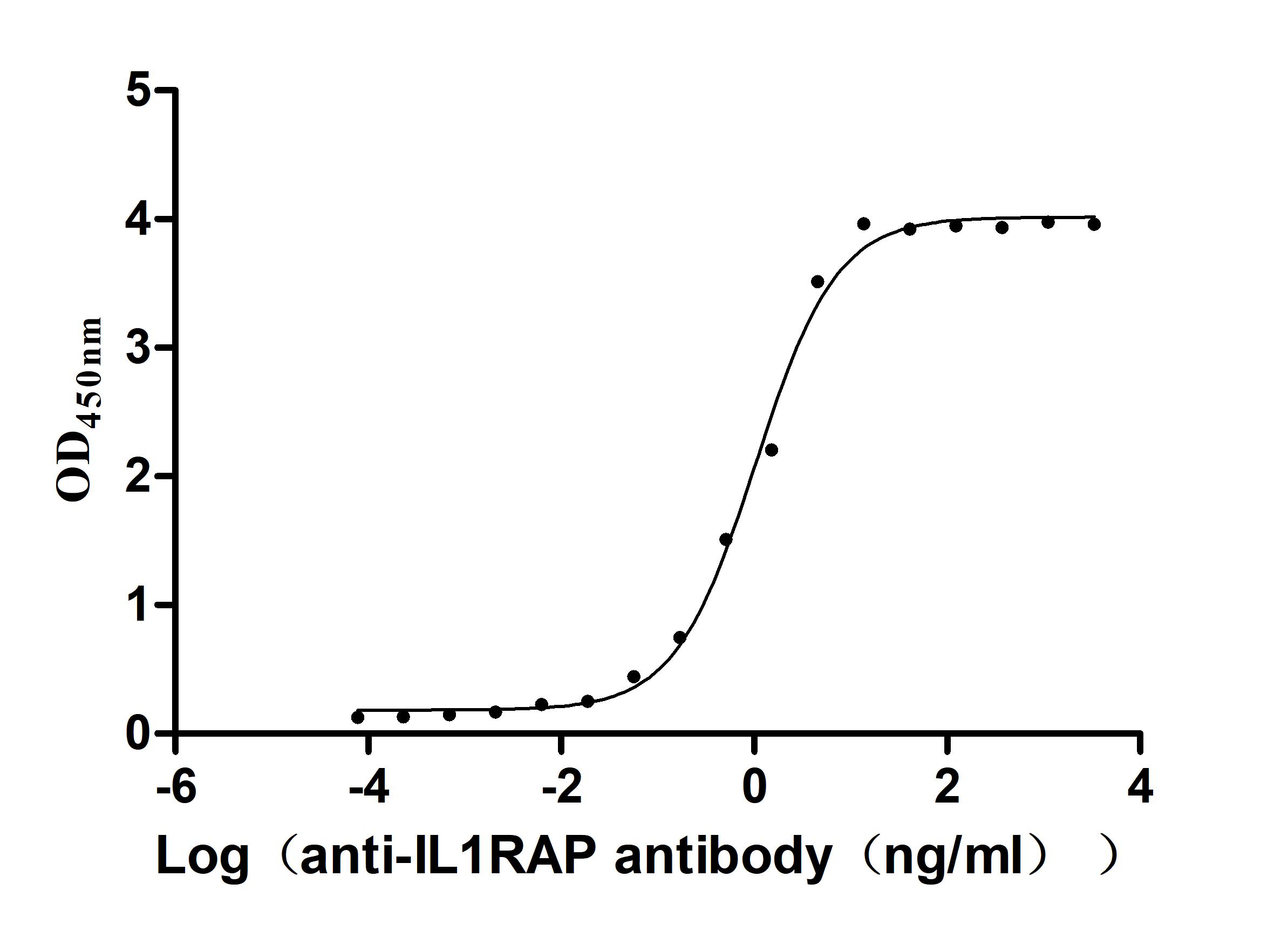Recombinant Human Protein tyrosine phosphatase type IVA 3 (PTP4A3)
-
货号:CSB-YP019014HU
-
规格:
-
来源:Yeast
-
其他:
-
货号:CSB-EP019014HU
-
规格:
-
来源:E.coli
-
其他:
-
货号:CSB-EP019014HU-B
-
规格:
-
来源:E.coli
-
共轭:Avi-tag Biotinylated
E. coli biotin ligase (BirA) is highly specific in covalently attaching biotin to the 15 amino acid AviTag peptide. This recombinant protein was biotinylated in vivo by AviTag-BirA technology, which method is BriA catalyzes amide linkage between the biotin and the specific lysine of the AviTag.
-
其他:
-
货号:CSB-BP019014HU
-
规格:
-
来源:Baculovirus
-
其他:
-
货号:CSB-MP019014HU
-
规格:
-
来源:Mammalian cell
-
其他:
产品详情
-
纯度:>85% (SDS-PAGE)
-
基因名:PTP4A3
-
Uniprot No.:
-
别名:Potentially prenylated protein tyrosine phosphatase; PRL 3; PRL R; PRL-3; PRL-R; PRL3; PRLR; Protein tyrosine phosphatase 4a3; Protein tyrosine phosphatase type IVA 3; Protein-tyrosine phosphatase 4a3; Protein-tyrosine phosphatase of regenerating liver 3; PTP 4A3; PTP4A3; TP4A3_HUMAN
-
种属:Homo sapiens (Human)
-
蛋白长度:Full length protein
-
表达区域:1-170
-
氨基酸序列MARMNRPAPV EVSYKHMRFL ITHNPTNATL STFIEDLKKY GATTVVRVCE VTYDKTPLEK DGITVVDWPF DDGAPPPGKV VEDWLSLVKA KFCEAPGSCV AVHCVAGLGR APVLVALALI ESGMKYEDAI QFIRQKRRGA INSKQLTYLE KYRPKQRLRF KDPHTHKTRC
-
蛋白标签:Tag type will be determined during the manufacturing process.
The tag type will be determined during production process. If you have specified tag type, please tell us and we will develop the specified tag preferentially. -
产品提供形式:Lyophilized powder
Note: We will preferentially ship the format that we have in stock, however, if you have any special requirement for the format, please remark your requirement when placing the order, we will prepare according to your demand. -
复溶:We recommend that this vial be briefly centrifuged prior to opening to bring the contents to the bottom. Please reconstitute protein in deionized sterile water to a concentration of 0.1-1.0 mg/mL.We recommend to add 5-50% of glycerol (final concentration) and aliquot for long-term storage at -20℃/-80℃. Our default final concentration of glycerol is 50%. Customers could use it as reference.
-
储存条件:Store at -20°C/-80°C upon receipt, aliquoting is necessary for mutiple use. Avoid repeated freeze-thaw cycles.
-
保质期:The shelf life is related to many factors, storage state, buffer ingredients, storage temperature and the stability of the protein itself.
Generally, the shelf life of liquid form is 6 months at -20°C/-80°C. The shelf life of lyophilized form is 12 months at -20°C/-80°C. -
货期:Delivery time may differ from different purchasing way or location, please kindly consult your local distributors for specific delivery time.Note: All of our proteins are default shipped with normal blue ice packs, if you request to ship with dry ice, please communicate with us in advance and extra fees will be charged.
-
注意事项:Repeated freezing and thawing is not recommended. Store working aliquots at 4°C for up to one week.
-
Datasheet :Please contact us to get it.
相关产品
靶点详情
-
功能:Protein tyrosine phosphatase which stimulates progression from G1 into S phase during mitosis. Enhances cell proliferation, cell motility and invasive activity, and promotes cancer metastasis. May be involved in the progression of cardiac hypertrophy by inhibiting intracellular calcium mobilization in response to angiotensin II.
-
基因功能参考文献:
- PRL-3 may be a reliable biomarker for early prostate cancer detection and may provide a predictive indicator of tumor progression PMID: 29207031
- The proliferation and invasion of colorectal cancer cells were enhanced significantly by PRL-3 through improving glycolysis. PMID: 28791350
- We conclude that PRL-3 is an important regulatory factor for breast cancer cell proliferation and invasion. Loss of PRL-3 function induces an antimetastatic gene expression profile in breast cancer cells. Due to its role in tumor growth and metastasis, PRL-3 emerges as a new therapeutic target in breast cancer therapy. PMID: 28980126
- Since high PRL-3 expression also correlates with poor prognosis in other cancers and functional studies in PC support these findings, PRL-3 emerges as a potential treatment target in PC PMID: 29190795
- Data show that phosphatase of regenerating liver-3 (PRL-3a) is an important mediator of growth factor signaling in MM cells and hence possibly a good target for treatment of MM. PMID: 27036022
- Data suggest that phosphatase of regenerating liver-3 (PRL-3)might play a tumor suppressor role in lung cancer, distinct from other cancers, by inhibiting epithelial-mesenchymal transition (EMT)-related pathways. PMID: 26967563
- A novel role of PRL-3 in tumor development through its adverse impact on telomere homeostasis. PMID: 28482095
- our result indicated that PRL-3 promotes protein phosphorylation by acting as an 'activator kinase' and consequently regulates cytokine secretion. PMID: 28068414
- The disruption of epithelial architecture by PRL-3 revealed here is a newly recognized mechanism for PRL-3-promoted cancer progression. PMID: 27656108
- This study suggests PRL-3 and SFKs are key mediators of the IL6-driven signaling events. PMID: 27698077
- Regulation of PTP4A3 expression is altered in specific subgroups of acute leukemias and this is likely brought about by expression of the aberrant ETV6-RUNX1 and BCR-ABL1 fusion genes. PMID: 28063378
- PRL-3 engages the focal adhesion pathway in trip0le-negative breast cancer cells as a key mechanism for promoting TNBC cell migration and invasion. PMID: 27452906
- PTP4A3 regulated glioblastoma multiforme via miR-137-mediated Akt/mTOR signaling pathway. PMID: 27328425
- Studies suggest that transcriptional, translational, or posttranslational regulation might be involved in the aberrant expression of phosphatase of regenerating liver (PRL)-3. PMID: 27911713
- we observed that PRL-3 regulated the clustering of integrin beta1 in FAs on collagen I but not on fibronectin. This work identifies PRL-3 as a new regulator of cell adhesion structures to the extracellular matrix, and further supports PRL-3 as a key actor of metastasis in uveal melanoma, of which molecular mechanisms are still poorly understood PMID: 28284838
- PTP4A3 may play a role in bladder cancer oncogenesis and is a predictive marker of metastasis. PTP4A3 overexpression represents an independent prognosticator for BC, suggesting its potential theranostic value. PMID: 26433386
- our results provide a bridge between PRL-3 and PTEN; PRL-3 decreased the expression of PTEN as well as increased the level of PTEN phosphorylation and inactivated it, consequently activating the PI3K/Akt signaling pathway, and upregulating MMP-2/MMP-9 expression to promote gastric cancer cell peritoneal metastasis. PMID: 27572739
- PRL-3 promotes cell migration and invasion via the NF-kappaB-HIF-1alpha-miR-210 axis. High levels of PRL-3 and miR-210 are related with poor OS in gastric cancer. PMID: 26548949
- Data suggest that induction of PRL3 (phosphatase of regenerating liver-3) contributes to increased cytoskeleton reorganization, increased cell motility, and possibly increased invasiveness of endometrial stromal cells (ESC) from subjects with endometrioma as compared to ESC from normal subjects. PMID: 26874360
- Results uncovered that aberrant overexpression of PRL-3 could initiate chordoma in early development. PMID: 26846972
- Role of PRL-3 in the development, migration, and invasion of salivary adenoid cystic carcinoma (SACC). PMID: 26041460
- PRL-3 has a role in the pathogenesis of prostate cancer. PMID: 26975394
- PRL-3 provides a strategic survival advantage to tumour cells via its effects on mTOR. PMID: 26597054
- Promotes uveal melanoma aggressiveness via membrane accumulation of matrix metalloproteinase 14 (MMP14) PMID: 27096756
- Our findings suggested that PRL-3 genomic gain may represent an aggressive phenotype of primary colorectal cancer PMID: 26563151
- Examination of clinical samples confirmed that USP4 expression positively correlates with PRL-3 protein expression, but not mRNA transcript levels. PMID: 26669864
- PTP4A3 over expression independently predicted the metastasis and outcome of upper tract urothelial carcinoma, which was even more important in organ confined disease. PMID: 26070892
- Data inticate that heat shock protein 60 (HSP60) interacted constitutively with NKG2D ligand ULBP2 and phosphatase of regenerating liver 3 (PRL-3) regulated HSP60 tyrosine phosphorylation. PMID: 25687758
- These studies reveal a critical role of autophagy in PTP4A3-driven cancer progression. PMID: 25136802
- miR-495 methylation-associated silencing inhibits the migration and invasion of human gastric cancer cells by directly targeting PRL-3 PMID: 25475733
- Tumor-associated macrophages participate in the metastasis of CRC induced by PRL-3 through secretion of IL-6 and IL-8 in a KCNN4 dependent manner. PMID: 24885636
- STAT3 binds to the -201 to -210 region of PRL-3. STAT3 functionally regulates PRL-3. STAT3 core signature was enriched in AML with high PRL-3 expression. The STAT3/PRL-3 regulatory loop contributes to the pathogenesis of AML. PMID: 25139404
- The expression of PRL-3, but not of E-cadherin, was associated with shorter survival of patients. PRL-3 and E-cadherin exhibit interactions in gastric cancer and are involved in the formation of lymph node metastases PMID: 24696260
- Aberrant PRL-3 expression promoted cell cycle progression and enhanced the antiapoptotic machinery of AML cells to drug cytotoxicity through downregulation of p21 and upregulation of Cyclin D1 and CDK2 and activation of STAT5 and AKT. PMID: 24737397
- PRL-3 and Leo1 levels were positively associated in AML patient samples. PMID: 24686170
- Studies indicate a significant association of phosphatase of regenerating liver 3 (PRL-3) overexpression with overall survival and some clinicopathological features in gastric cancer. PMID: 24204707
- PRL3 provokes a tyrosine phosphoproteome to drive prometastatic signal transduction. PMID: 24030100
- The strong expression of PRL-3 in the primary tumor that was significantly correlated with the grade and clinical stage suggest that PTP4A3 participates in the process of endometrial carcinogenesis. PMID: 23729584
- PRL-3 induces microvascular vessel formation by facilitating VEGF expression in endometrial adenocarcinoma tissues PMID: 23989302
- These findings strongly support a role for PTP4A3 as an important contributor to endothelial cell function and as a multimodal target for cancer therapy and mitigating VEGF-regulated angiogenesis. PMID: 24403062
- Clinically, high PRL-3 mRNA expression was associated with FLT3-ITD mutations in four independent acute myeloid leukaemia datasets with 1158 patients. PMID: 23929599
- PRL-3 is phosphorylated downstream of Src, and this phosphorylation is required for PRL-3 to promote invasion, motility and activation of RhoC in cell culture systems. PMID: 23691193
- our findings demonstrate that PRL-3-targeted DNA vaccine can generate significantly preventive and therapeutic effects on the growth of breast cancer expressing PRL-3 through the induction of cellular immune responses to PRL-3 PMID: 23364316
- PRL-3-induced hyperactivation of EGFR correlates with increased cell growth, promigratory characteristics, and tumorigenicity in colorectal cancer. PMID: 23867504
- Explored the mechanism by which PRL-3 mediates EMT. Demonstrated that PRL-3 induced the expression of KCNN4 channels, leading to EMT and the down-regulation of E-cadherin. PMID: 23572150
- The ability of DHEA to target prenylation pathway could be utilized to inhibit PRL-3 prenylation for successful prevention of CRC metastases. PMID: 23462371
- PRL-3 plays a critical role in ovarian cancer tumorigenicity and maintaining the malignant phenotype. PRL-3 may inhibit c-fos transcriptional regulation of integrin alpha2 signaling. PMID: 23418787
- PRL-3 expression was related to LVI or necrosis which is important for tumor invasiveness, we could not find that PRL-3 as an important prognostic factor in breast cancer patient PMID: 22855168
- High expression of the PRL-3 gene might be a useful predictor of poor postoperative outcome in patients with colorectal cancer. PMID: 22440248
- PRL-3 is a key regulator of histone demethylation. JMJD1B seems to be a candidate tumour suppressor and JMJD2B seems to be a potential oncoprotein in the development and progression of CRC. PMID: 22345654
显示更多
收起更多
-
亚细胞定位:Cell membrane. Early endosome.
-
蛋白家族:Protein-tyrosine phosphatase family
-
组织特异性:Mainly expressed in cardiomyocytes and skeletal muscle; also found in pancreas. Consistently overexpressed in colon cancer metastasis.
-
数据库链接:
HGNC: 9636
OMIM: 606449
KEGG: hsa:11156
STRING: 9606.ENSP00000332274
UniGene: Hs.43666
Most popular with customers
-
Recombinant Human Hepatocyte growth factor receptor (MET), partial (Active)
Express system: Mammalian cell
Species: Homo sapiens (Human)
-
Recombinant Human B-lymphocyte antigen CD20 (MS4A1)-VLPs (Active)
Express system: Mammalian cell
Species: Homo sapiens (Human)
-
Recombinant Human Complement component C1q receptor (CD93), partial (Active)
Express system: Mammalian cell
Species: Homo sapiens (Human)
-
Express system: Mammalian cell
Species: Homo sapiens (Human)
-
Recombinant Macaca fascicularis Interleukin 1 receptor accessory protein(IL1RAP), partial (Active)
Express system: Mammalian cell
Species: Macaca fascicularis (Crab-eating macaque) (Cynomolgus monkey)


